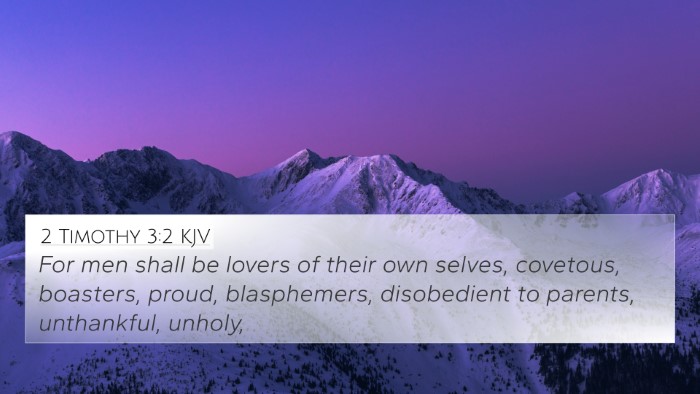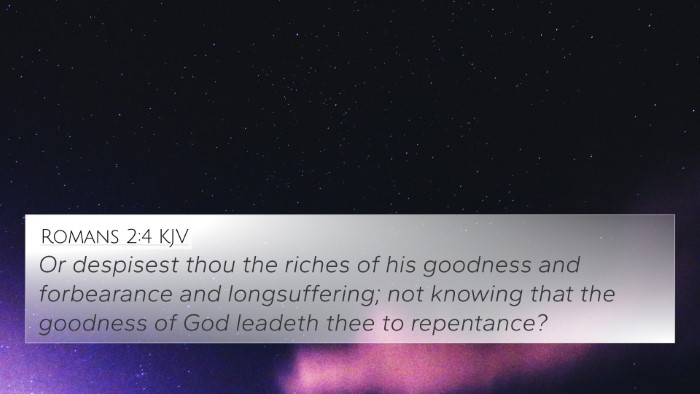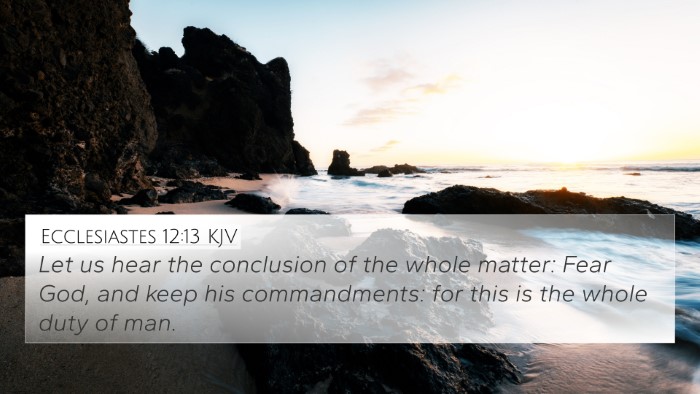Proverbs 14:2 - Summary and Interpretation
Proverbs 14:2 states, "He who walks in his uprightness fears the Lord, but he who is perverse in his ways despises Him." This verse serves as a moral dichotomy, contrasting the behavior of the righteous versus the wicked and their respective attitudes toward God.
Verse Meaning and Insights
The central message of this verse emphasizes the importance of integrity and the fear of the Lord as fundamental principles guiding a righteous life. Public domain commentaries provide valuable insights into this text.
Insights from Commentaries
-
Matthew Henry:
Henry highlights that walking in uprightness reflects obedience to God and His commandments, promoting a respectful and reverent attitude toward the divine. The contrast with the perverse individual signifies a rejection of God's laws and, ultimately, a skirting of divine authority.
-
Albert Barnes:
Barnes emphasizes the concept of “fear” as a deep respect and reverence for God, which is intrinsic to the character of a believer. Conversely, those who are perverse in their ways demonstrate their disdain for God by disregarding His commands.
-
Adam Clarke:
Clarke interprets “perverse” as straying from the truth. He points out that this verse encapsulates the essential attitude of individuals towards God determined by their moral choices, illustrating the difference between the obedient and the rebellious.
Connections with Other Bible Verses
Proverbs 14:2 connects with various biblical texts that reinforce its themes. Here are several notable cross-references:
- Psalm 112:1: "Blessed is the man who fears the Lord, who greatly delights in His commandments." This verse parallels the theme of reverence and righteous living.
- Proverbs 10:9: "Whoever walks in integrity walks securely, but he who makes his ways crooked will be found out." This verse highlights the security that comes with uprightness.
- Proverbs 3:7: "Be not wise in your own eyes; fear the Lord, and turn away from evil." This verse reinforces the principle of fearing God and living a life free from sin.
- Job 28:28: "And to man He said, ‘Behold, the fear of the Lord, that is wisdom, and to turn away from evil is understanding.'" This verse echoes the association between wisdom, the fear of the Lord, and moral conduct.
- Isaiah 33:14: "The sinners in Zion are afraid; trembling has seized the godless: 'Who among us can dwell with the consuming fire? Who among us can dwell with everlasting burnings?'" This verse highlights the consequences of ignoring the fear of God.
- Romans 1:18: "For the wrath of God is revealed from heaven against all ungodliness and unrighteousness of men who by their unrighteousness suppress the truth." This stresses the perils of a perverse nature.
- Philippians 2:12: "Therefore, my beloved, as you have always obeyed, so now, not only as in my presence but much more in my absence, work out your own salvation with fear and trembling." This ties back to the necessity of reverent obedience.
Thematic Bible Verse Connections
The thematic connections found in Proverbs 14:2 extend into several areas of biblical teaching, particularly those that relate to moral integrity, the importance of fearing God, and the consequences of one’s actions. The scriptures illustrate that righteousness is synonymous with a healthy relationship with God.
Understanding through Cross-Referencing
Cross-referencing Bible verses allows for a deeper understanding of the scriptural context and enhances the ability to see how various scriptures connect with one another. For instance, by examining the interplay between Proverbs 14:2 and the verses mentioned above, one can discover:
How the themes of fear and uprightness are foundational across both the Old and New Testaments, revealing a consistent call to holiness and right living.
Conclusion
Proverbs 14:2 serves as both a reflection and a guide for understanding the foundational principles of morality in biblical thought. By understanding the connections and utilizing tools for Bible cross-referencing, believers can enrich their spiritual insight and grow in knowledge of God's word.























